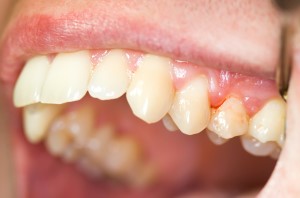 Treating early and with diligent care, many patients can successfully recover from gingivitis and improve their overall dental and oral health. Gingivitis is inflammation in the gingiva or gum tissue that surrounds and supports the teeth and jaws. This gum tissue, when healthy, should be a pale pink color and it should be somewhat taut or firm. The healthy gum tissue should also be able to endure regular flossing and brushing without bleeding.
Treating early and with diligent care, many patients can successfully recover from gingivitis and improve their overall dental and oral health. Gingivitis is inflammation in the gingiva or gum tissue that surrounds and supports the teeth and jaws. This gum tissue, when healthy, should be a pale pink color and it should be somewhat taut or firm. The healthy gum tissue should also be able to endure regular flossing and brushing without bleeding.
When the gums appear red and start readily bleeding with even minor flossing and brushing, this is an indication that irritation is a problem. These symptoms are typically accompanied by swelling or puffiness in the gum tissue, usually around the edges nearest the teeth. These regions can become further inflamed from chewing foods, avoiding daily flossing and brushing habits, and allowing the problem to progress. The gums may feel tender or sore around the puffy regions, but in general, gingivitis is not painful so many patients overlook the signs. [pullquote]Gingivitis is inflammation in the gingiva or gum tissue that surrounds and supports the teeth and jaws.[/pullquote]
Over time the gums start receding, leaving teeth more exposed and often resulting in increased sensitivity in teeth, especially along the gum line where portions of the teeth are no longer covered and protected by the gum tissue. If left untreated, pockets can develop within the gum tissue, trapping food particles and bacteria. These pockets can become problematic, occasionally requiring surgical treatment to remove the infection.
Signs of gingivitis are often detected in regular checkups with a dentist and maintaining appointments for yearly or twice yearly cleanings can go a long way in preserving dental and oral health. Discontinuing tobacco products and other unhealthy substance usage, improving nutritional intake, and becoming diligent with oral health habits for at-home care will drastically improve overall oral health and treatment efforts for improving gingivitis.
Certain preexisting conditions and prescription medications can leave patients susceptible to gingivitis and other dental health concerns. Discussing these concerns with the dentist at regular checkups can help improve patient understanding and help prevent or combat signs of gum disease and related dental health issues.
For more information about preventing gingivitis and maintaining oral health for life, contact our caring dentistry team today!
